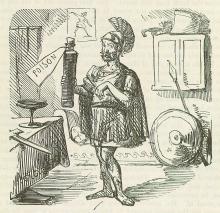Romans demand that Hannibal be surrendered (1–3). When Hannibal discovers that he is surrounded by his enemies, he commits suicide (4–5).
(1) quae: connective relative (AG §308f).
geruntur: historical present, see on adficitur (4.3).
accidit cāsū: impersonal, "it happened by chance"; its subject is furnished by the substantive clause, ut lēgātī Prūsiae...cenārent.
Rōmae: locative.
apud T. Quinctium Flāminīnum cōnsulārem: "at the house of…"; cōnsulārem: "ex-consul." Titus Quinctius Flamininus (c. 229 – c. 174 BC) defeated Philip V of Macedon at the Battle of Cynocephalae in 197 BC, ending Macedonian domination of Greece. The following year Flamininus appeared at the Isthmian Games and flamboyantly declared that the Greeks were free from foreign domination. Fifty years later Greece was reduced to a Roman province after Rome defeated the Achaean League at the Battle of Corinth in 146 BC, the same year that Rome destroyed Carthage.
dē Hannibale mentiōne factā: ablative absolute that includes the prepositional phrase, dē Hannibale.
ex iīs ūnus: partitive, "one of them," i.e., the lēgātī Prūsiae.
eum: i.e., Hannibal.
(2) senātuī: dative with the compound verb, dētulit, "he communicated."
patrēs cōnscrīptī: "enrolled fathers," the standard appellation for Roman senators.
quī...existimārent: relative clause of characteristic indicating cause (AG §535e), "because they judged...."
Hannibale vīvō: ablative absolute; since Latin lacks the present or perfect participle of esse, an ablative absolute can contain a noun and adjective or two nouns in the ablative (AG §419a).
in iīs Flāminīnum: "Flamininus (was included) among these" (i.e., the Roman legates).
quī ab rēge peterent: relative clause of purpose, "in order to ask...."
inimīcissimum: "greatest enemy"; object of both habēret and dēderet.
suum and sibi: indirect reflexives (AG §300.2), because they refer to the words or thoughts of those making the demand (lēgātī). sēcum: a direct reflexive referring to Prusias, the subject of its own clause (AG §300.1). Both uses of the reflexive are standard; the situation—who has Hannibal and to whom he must be given—prevents confusion.
sibique dēderet: ut is not necessary because –que continues the indirect command introduced by nē; the singular subject of habēret and dēderet must be Prusias (ab rēge).
(3) negāre: "to give a negative answer," with a dative, hīs [lēgātīs].
illud: emphatic; it agrees with the substantive purpose clause that follows, nē id ā sē fierī postulārent (AG §563, sometimes called a jussive noun clause). Postulārent usually expects a substantive purpose clause but Nepos uses an accusative + infinitive to avoid placing a confusing ut immediately after nē.
ā sē: indirect reflexive, see note above on suum and sibi.
quod: relative; its antecedent is id.
adversus iūs hospitiī: for the Romans, hospitality (hospitium) or the proper treatment of guests (hospitēs) was among the stongest bonds between individuals. As with the social institution of xenia among the Greeks, the Romans deemed a violation of hospitium to be a great impiety and the protection due a guest was often deemed greater than that due blood relatives. Prusias, therefore, in appealing to the iūs hospitiī is not merely citing etiquette, but evoking one of the most fundamental and universally recognized social conventions of the ancient world. Compare the biblical story of Lot, who offered his virgin daughters to a drunken crowd that was demanding two guests whom Lot had just met.
ipsī...comprehenderent: an indirect command dependent on an implied verb of commanding (e.g. Prusias iussit); ipsī: i.e., the lēgātī Rōmānī.
ubi esset: subject is Hannibal.
inventūrōs [esse]: depends on an implied verb of saying (e.g., Prusias dīxit; 10.5, 10.6).
ūnō locō: when the ablative of place appears with an adjective, the preposition (in) is often omitted; compare in Italiā, but tōtā Italiā.
mūnerī: dative of purpose, used to show what a thing accomplishes, "as a gift"; often with a dative of the person affected, eī (AG §382).
idque sīc aedificā(ve)rat, ut...exitūs habēret: result clause signaled by sīc; exitūs is accusative plural.
nē ūsū venīret, quod accidit: fear clause dependent on verēns. ūsū venīret: idiom, "it happens, occurs," especially common in Nepos and his contemporary Cicero. quod accidit: the relative clause serves as subject of venīret.
(4) puer: often used for "slave" without reference to age.
plūrēs praeter cōnsuētūdinem armātōs: Nepos embeds a prepositional phrase, praeter cōnsuētūdinem ("more than was usual"), within the noun-adjective phrase that it modifies.
quī imperāvit eī: introducing the substantive clause of purpose, ut...circumīret ac properē sibi nuntiāret (AG §563). quī: connective relative; its antecedent must be Hannibal (a slave would not be giving orders to the general). eī: i.e., the slave; dative with imperāvit.
num...obsidērētur: in indirect questions, num does not expect a negative answer, as it does in direct questions. [Image: Cicak, Hannibal Surrounded]
eōdem modō: ablative of manner.
(5) puer: the subject of the circumstantial cum clause (cum...renūntiāsset...que...ostendisset) is shifted before the subordinating conjunction.
sēnsit: subject is Hannibal; introduces three indirect statements:
a) id nōn…factum [esse],
b) sed sē petī,
c) neque…vītam esse retinendam.
fortuītō: adverb, "by chance."
sē: reflexive, referring to Hannibal.
sibi: dative of agent with the periphrastic, esse retinendam.
quam nē aliēnō arbitriō dīmitteret: negative purpose clause. quam: connective relative; its antecedent is vītam. aliēnō arbitriō: "by another’s will."
memor: "mindful of" + objective genitive, prīstinārum virtūtum (AG §347–348).
venēnum: the Roman satirist Juvenal records that Hannibal kept the poison in a ring (Satire 10.164: "but a little ring was the redeemer of Cannae and avenger of so much blood," sed ille Cannārum vindex ac tantī sanguinis ultor, anulus). According to other accounts, Hannibal had a slave strangle him with his military cloak, or he drank bull’s blood, which was thought to congeal so quickly that it would suffocate the drinker (Plutarch, Life of Flamininus 20). His great rival, Scipio Africanus, may have died in the same year. [supplementary texts: Descriptions of Hannibal's death by Plutarch, Juvenal, Appian, and Justin]
cōnsuē(ve)rat: syncopated perfect (AG §181).




